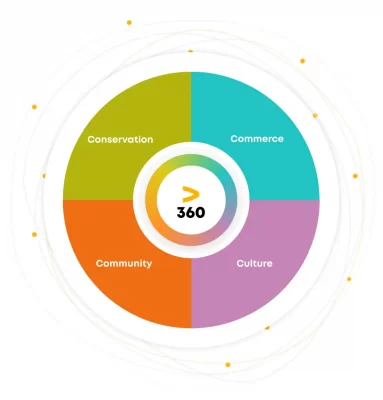Weeva’s sustainability management platform helps tourism properties track, measure, and report on their sustainable operations in one central platform. So you can finally tell the world your sustainability story, grounded in data and facts. We spoke to Julie Cheetham,...
Weeva’s sustainability management platform helps tourism properties track, measure, and report on their sustainable operations in one central platform. So you can finally tell the world your sustainability story, grounded in data and facts. We spoke to Julie Cheetham, Managing Director of Weeva. Read about the inspiration and vision behind the platform taking conservation to new heights!
A 360-degree view of our planet can transform our perspective of the world and our impact on it. The ‘Overview Effect,’ a term coined more than three decades ago by the author Frank White, describes a state of transformation that overwhelms astronauts and space travellers when they catch a glimpse of planet Earth from space. The effect of this experience can change their view of the world, of themselves, and of the future. In fact, many of those who have been lucky enough to see our planet from outer space say they no longer see national, cultural, or ethnic differences but one people and one world.
Why a 360-degree sustainability management solution?
Space travel has allowed humanity to see planet Earth from an unprecedented angle and, to some extent, kindled a fire of environmentalism. The travel and tourism sector now has the opportunity to stoke that flame and be a catalyst for positive change. With its global reach, economic impact, and substantial labour market share[1], it is undoubtedly a leading force. However, with this comes responsibility. The decisions and actions taken today in this sector can impact the future of our planet and the lives of billions of people. Contributing to an estimated 8 to 11% of total greenhouse gas emissions[2], the sector needs to rebalance its relationship with the planet and its people. To do so, it needs a new perspective: a 360-degree view of our world.
 This quest for a new perspective that would transform the sector’s resilience and sustainability led Lindsey Walter and Julie Cheetham to create Weeva – a pioneering digital 360-degree sustainability management solution. Accessibility, inclusion, and the democratisation of sustainability in the sector form its core offering. A uniquely designed software, Weeva offers a 360-degree interconnected system of tools and easy-to-use technology that tracks and reports on the net environmental and social impact for a plethora of users, from BnBs to luxury safari lodges, boutique urban boltholes, and corporate travel hotel chains.
This quest for a new perspective that would transform the sector’s resilience and sustainability led Lindsey Walter and Julie Cheetham to create Weeva – a pioneering digital 360-degree sustainability management solution. Accessibility, inclusion, and the democratisation of sustainability in the sector form its core offering. A uniquely designed software, Weeva offers a 360-degree interconnected system of tools and easy-to-use technology that tracks and reports on the net environmental and social impact for a plethora of users, from BnBs to luxury safari lodges, boutique urban boltholes, and corporate travel hotel chains.
Weeva breaks down the barriers of entry to sustainability and gives everyone in the travel and tourism sector the tools to make a difference by offering the technology that enables businesses to extract crucial sustainability data and measure the impact of their operations.
An ‘Overview Effect’ for the travel and tourism sector
A truly holistic approach to measuring sustainability cannot be limited in its scope or rely solely on a handful of focus areas. Basing sustainability performance on the parameter of, say, carbon emissions alone is not enough. This is why we built Weeva’s core framework around The Long Run’s 4Cs: Conservation, Community, Culture, and Commerce. Taking these the 4Cs, we then created 18 interconnected parameters that, when managed holistically, offer businesses a wide perspective of the impact of their operations – whether negative or positive. Users can also access a wealth of tools, policy documents, and guidance that will inform and steer their actions toward a more sustainable future for their business and the sector as a whole.
Put together, the 4Cs and Weeva’s handy guides create the 360-degree view that gives businesses operating in the travel and tourism sector the perspective they need to embark on their sustainability journey. This is our contribution to making the sector more resilient and profitable without sacrificing its ability to make sustainable change happen to make the world a better place to be.
From biodiversity protection and climate action to respect for cultural heritage and commercial, ethical practices and resilience, Weeva’s 360? Framework is a lens like no other. It is a lens that radically transforms the way travel and tourism stakeholders, businesses, and leaders see the sector and their role in making it a bulwark of global sustainability. It is the sector’s ‘Overview Effect.’
 Earthrise by astronaut William Anders on December 24, 1968
Earthrise by astronaut William Anders on December 24, 1968
We are all in it together
If you google “the most influential environmental photograph,” the top search results will show you ‘Earthrise’ – the famous picture taken by the astronaut Bill Anders on Christmas Eve 1968 from aboard Apollo 8. His picture has captured the hearts of countless people since it was taken over half a century ago. What it shows transcends the aesthetic appeal of planet Earth rising behind the lunar surface. It shows one world and one global community whose destiny is intrinsically linked to the destiny of this planet. It shows that we are all in it together.
With the hotel and travel industry worth over $2 trillion worldwide, the sector can be a powerful force for change. After all, this is a sector with a global reach like no other and a deep connection to the planet’s natural assets. To borrow Neil Armstrong’s famous words, any small step taken by the tourism sector can be one giant leap in sustainability for the whole world. Weeva is the perfect stepping stone for businesses across the tourism sector to start on their sustainability journey and become drivers of positive change. With Weeva, it’s no longer business as usual; it’s time to just start.
[1] https://wttc.org/research/economic-impact
[2] https://wttc.org/Portals/0/Documents/Reports/2021/WTTC_Net_Zero_Roadmap.pdf
The post Weeva: The Technology Transforming Travel and Tourism for People and Planet appeared first on We Are Africa.











